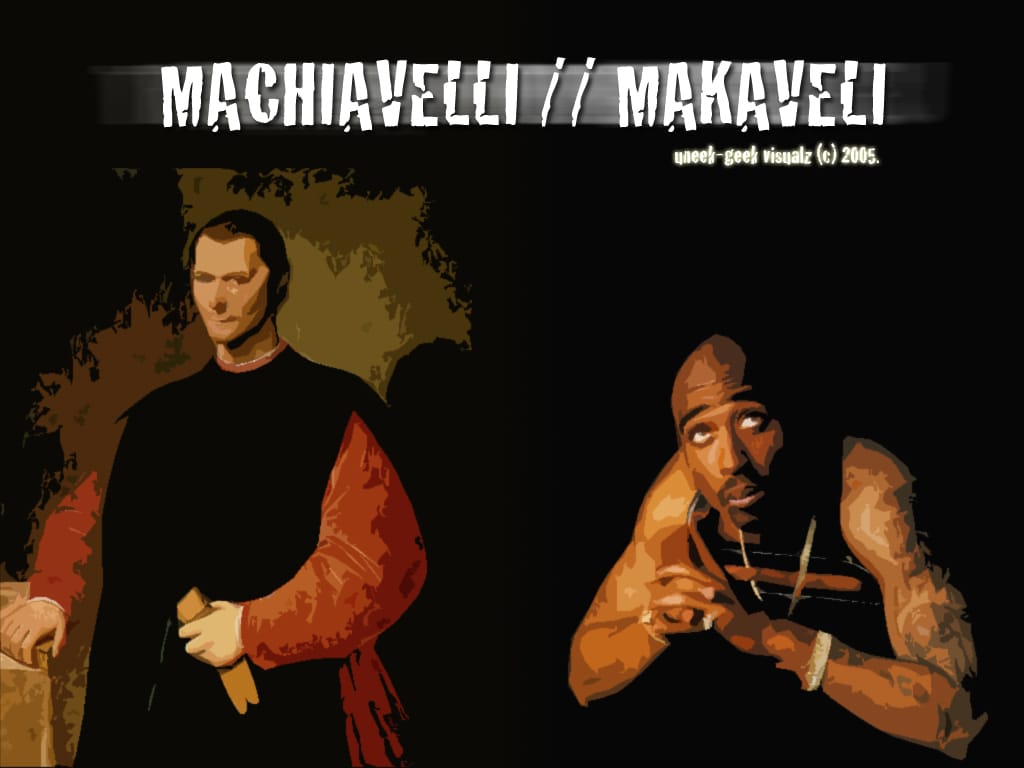Deciphering “Makaveli”: A Deep Dive into Tupac’s Alter Ego
In the realm of hip-hop, few names resonate with the same power and intrigue as “Makaveli” – the alter ego adopted by Tupac Shakur in the final chapter of his life. This transformation, far from a mere stage name change, signaled a profound shift in Tupac’s worldview, heavily influenced by the writings of 16th-century Italian philosopher Niccolò Machiavelli. This article delves into the depths of this transformation, exploring the motivations, meaning, and lasting impact of Tupac’s decision to embrace the persona of “Makaveli.”
I. The Genesis of “Makaveli”
Tupac’s fascination with Machiavelli likely began during his 1995 imprisonment. It was within the confines of his cell that he delved into “The Prince,” Machiavelli’s controversial treatise on acquiring and maintaining political power. This work, known for its pragmatic, and some would argue, ruthless approach to leadership, resonated deeply with Tupac, who saw parallels between the struggles for power in Machiavelli’s Italy and the realities he faced in the music industry and within marginalized communities.
Upon his release, Tupac emerged with a transformed perspective, adopting “Makaveli,” a variation of “Machiavelli,” as a symbol of his newfound understanding of power dynamics and his commitment to challenging the status quo. This marked a turning point, not only in his artistic expression but also in his personal evolution as a revolutionary figure.
II. Deconstructing the Meaning
To fully comprehend the significance of “Makaveli,” we must dissect the layers of meaning embedded within. For Tupac, the “K” held particular significance, representing “Killing the Illuminati ” – a term he used to describe the oppressive forces he believed controlled society. This wasn’t just about artistic expression; it was a calculated strategy to use his platform to expose injustice and inspire change.
“Makaveli” represented a rebirth, a chance for Tupac to shed the constraints of his former self and emerge as a more strategic and influential force. It was a calculated move, echoing Machiavelli’s belief in leveraging any and all resources to achieve one’s goals. This transformation wasn’t about glorifying ruthlessness but about understanding the complexities of power and using those insights to empower the marginalized.
III. Manifestation in Music
The culmination of Tupac’s transformation was embodied in his final studio album, “The Don Killuminati: The 7 Day Theory,” released posthumously under the Makaveli alias. This album, recorded in a remarkably short three days, served as Makaveli’s manifesto, showcasing a darker, more politically charged side of Tupac’s artistry.
The lyrics, infused with Machiavelli’s influence, explored themes of betrayal, political corruption, and the need for radical change. Songs like “Bomb First (Motherfuckers)” and “Hail Mary” became anthems for rebellion, reflecting Tupac’s evolving worldview and his growing impatience with injustice. “The Don Killuminati: The 7 Day Theory” cemented Tupac’s legacy as a cultural icon whose music transcended entertainment, becoming a call to action for social change.
Tupac’s Statement (1996 Interview):
“My name is not Machiavelli. My name is Makaveli. I took it, that’s mine. He gave me that. And I don’t feel no guilt. All these motherf** stole from us forever. I’m taking back what’s mine.”
IV. Unique Insights & Untapped Potential
While Tupac’s embrace of Machiavelli’s ideas is undeniable, it’s crucial to recognize that he wasn’t simply mimicking a 16th-century philosopher. Instead, he adapted those teachings to fit his own experiences and worldview, creating a unique persona that transcended any direct comparison. Tupac, even when espousing Machiavellian tactics, remained deeply committed to compassion and social justice. This duality, often overlooked, adds layers of complexity to the “Makaveli” persona, deserving of further exploration.
Moreover, analyzing “Makaveli” through a sociopolitical lens can offer a richer understanding of Tupac’s motivations. The racial tensions, political turmoil, and social injustices of his era undoubtedly shaped his worldview and fueled his desire for radical change. Examining “Makaveli” within this context reveals the depth of Tupac’s message and its continued relevance in today’s world.
Finally, it’s impossible to ignore the ongoing fascination with the “Makaveli” persona, particularly the conspiracy theories surrounding Tupac’s death. Whether these theories hold any weight is debatable, but they highlight the enduring power of the “Makaveli” myth. This fascination speaks to the unanswered questions surrounding Tupac’s demise and the desire to believe that his message of resistance continues, even in his absence.
Want to know how Muslims explain the resurrection of Jesus? Read this article.
Interested in the meaning behind the markings on Teddy Roosevelt’s pocket watch? This article unravels the mystery.
Curious about Darwin’s influence on Malthus? Explore this insightful discussion.









